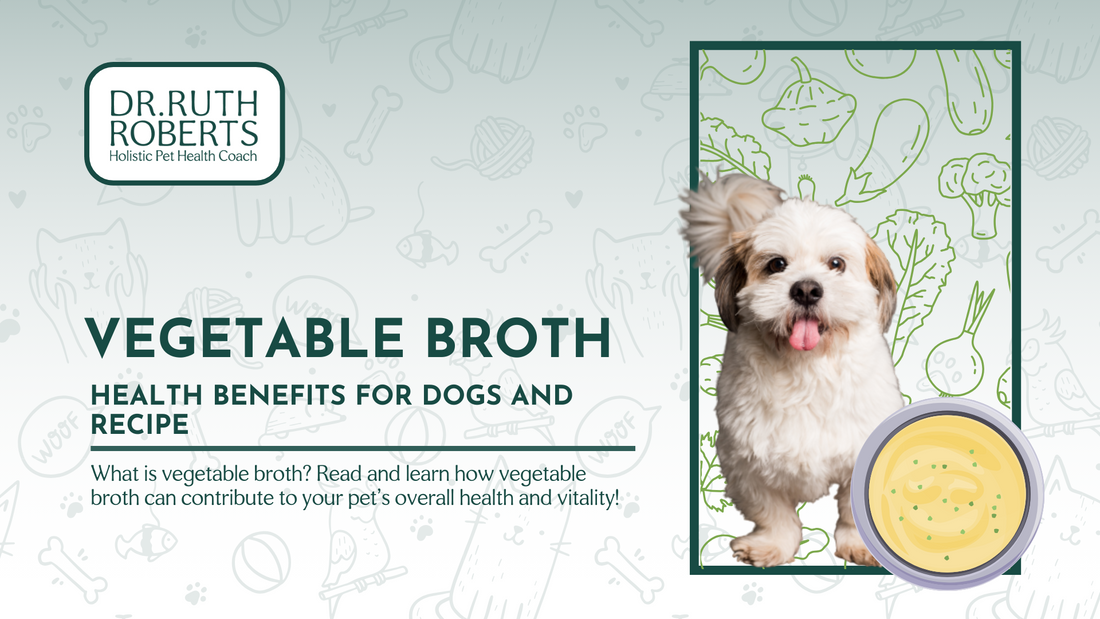Vegetable broth has gained popularity in human diets as a nutrient-rich, plant-based alternative to bone broth. Made by simmering a variety of vegetables, it’s often praised for its vitamins, minerals, and soothing properties. But as more pet parents look for healthy, natural options for their dogs, a common question arises: can dogs have vegetable broth too?
In this blog, we’ll explore the nutritional value of vegetable broth, its potential benefits for dogs, and what ingredients to avoid. If you’re considering adding this warm, savory liquid to your dog’s bowl, here’s what you need to know to do it safely and wisely.
What Is Vegetable Broth?

Vegetable broth is a savory liquid obtained by simmering a medley of assorted vegetables in water. It serves as a flavorful base for soups, stews, sauces, and various culinary dishes. Renowned for its versatility and rich, aromatic profile, vegetable broth is a beloved staple in vegetarian and vegan cuisines. Unlike meat-based broths, which derive their flavor from animal bones, vegetable broth extracts its robust taste from an amalgamation of vibrant vegetables.
For humans, there are no strict rules on which vegetables to use, some common staples include onion, carrots, celery, tomatoes, garlic, and a variety of herbs and spices. These ingredients not only contribute to the broth’s flavor but also infuse it with a spectrum of essential vitamins, minerals, and antioxidants. Additionally, the absence of animal products makes vegetable broth suitable for a wide range of dietary preferences and restrictions. Vegetable broth is naturally low in calories and fat, making it a figure-friendly option. However, what sets vegetable broth apart is its impressive vitamin and mineral content. It’s a valuable source of vitamins like vitamin C, vitamin K, and various B-complex vitamins. Vegetable broths emerge as a cornerstone for supporting bodily functions, bolstering the immune system, and promoting overall well-being.
Can Vegetable Broth Be Made for Dogs?
Yes! Vegetable broth can be made for cats and dogs, but it’s important to do so with their specific dietary needs in mind. Vegetable broth for dogs and cats typically consists of pet-safe vegetables and herbs. Here’s a basic recipe for homemade vegetable broth suitable for both cats and dogs:

- Carrots
- Sweet potatoes
- Green beans
- Peas
- Pumpkin (plain, not pie filling)
- Zucchini
- Parsley
- Thyme
- Water
Julliette de Baïracli Levy, author of The Complete Herbal Handbook for the Dog and Cat, was really into veggie broths. Levy, a fervent advocate for natural remedies, extolled the virtues of vegetable broths, employing them alongside grains and beans on non-meat days to nourish her dogs and cats. This holistic approach not only provided essential nutrients but also harnessed the phytonutrients and antioxidants inherent in plant-based origins, amplifying the broth’s potential health benefits.
Potential Benefits of Vegetable Broth for Dogs
Introducing alternatives like vegetable broth can be a valuable addition to a dog’s hydration routine, the flavor might can encourage them to consume more liquids. Moreover, vegetable broth can offer these benefits for your dogs:
Natural Nutrient Supplementation
Vegetable broth is a nutrient-dense option, providing essential vitamins and minerals derived from its vegetable components. This supplementation can be particularly beneficial for dogs on restricted or specialized diets. It serves as a source of vital nutrients like vitamins A, C, and K, as well as essential minerals like potassium and calcium, contributing to their overall nutritional profile.
Digestive Health Support
The gentle, easily digestible nature of vegetable broth makes it a soothing choice for dogs with sensitive stomachs or those recovering from gastrointestinal issues. It can help alleviate digestive discomfort and provide a temporary source of nourishment for dogs experiencing a decreased appetite. Additionally, the broth’s natural compounds may support a healthy gut microbiome, promoting overall digestive wellness.
Risks and Considerations of Vegetable Broth for Dogs
Introducing vegetable broth into your dog’s diet can be a nutritious addition, but it’s crucial to be aware of potential risks and considerations:
Allergies and Sensitivities
Just like humans, dogs can have allergies or sensitivities to certain ingredients. It’s advisable to introduce vegetable broth in small quantities initially and monitor for any signs of allergic reactions or digestive discomfort. If any adverse reactions occur, discontinuing use is recommended.
Common signs of allergic reactions or sensitivities in dogs include: Digestive Upset or abdominal discomfort, Itching or Skin Irritation, coughing, wheezing, restlessness, and lethargy. If your dog appears unusually tired or lacking in energy after consuming vegetable broth, it may be indicative of an adverse reaction.
Special Considerations for Dogs with Certain Health Conditions
Dogs with specific health conditions, such as kidney disease or heart conditions, may have unique dietary requirements. It’s imperative to consult with a veterinarian before incorporating vegetable broth or any new elements into their diet. They can provide tailored recommendations to ensure the broth aligns with the dog’s specific health needs.
Potential Harmful Ingredients

Commercial vegetable broths may contain ingredients like onions or garlic, which can be harmful to dogs if served in amounts that are dangerous for them. These foods can lead to adverse effects, including gastrointestinal upset and, in severe cases, more serious health complications. It’s crucial for you to carefully inspect labels before buying commercial vegetable broth. Opt for homemade broth or commercial broths without these potentially harmful components.
High Sodium Content in Commercial Broths
While vegetable broth is generally considered a healthy option, it’s important to be mindful of commercial varieties that may contain excessive sodium levels. High sodium intake can lead to health issues like elevated blood pressure and kidney strain. Opting for low-sodium or homemade versions can mitigate this concern.
Key Takeaway
Throughout this blog, we’ve explored about vegetable broth and its potential benefits for our canine companions. Vegetable broth is a nutrient-dense elixir, rich in vitamins, minerals, and antioxidants derived from an array of vibrant vegetables. Its versatility and adaptability make it an excellent addition to a dog’s diet.
Upon incorporating vegetable broth into your dog’s diet, pay close attention to their reaction. Watch for any signs of digestive discomfort, allergies, or changes in behavior. If any adverse reactions occur, discontinue use and consult your veterinarian. You also can opt for online consultation with a Holistic Pet Health Coach for specific guidance on ingredients that cater to your dog’s unique health requirements.
Remember, every dog is unique, and what works for one may not be suitable for another. Always prioritize your pet’s individual well-being.
FAQ on Can Dogs Have Vegetable Broth?
How much vegetable broth is safe for dogs?
A good starting point is adding a small amount to their regular meals and observing their response. Typically, one to two tablespoons per meal is a reasonable portion size, depending on your dog’s size and individual needs.
Can dogs have vegetable broth everyday?
While occasional vegetable broth can be a healthy treat, it’s best not to give it to dogs every day. Moderation is key to a balanced diet.
Can I mix broth with dog food?
Yes, you can mix broth with your dog’s food to enhance flavor and moisture content, but ensure it’s low-sodium and doesn’t replace their regular diet.
Can I use vegetable broth as a substitute for water in my dog's meals?
No. While vegetable broth can add flavor and nutrients to your dog’s meals, it’s important to ensure they still have access to plain water for proper hydration.
Homemade vs. store-bought vegetable broth: Which is better?
Homemade broth can be better as it allow you can tailor the recipe to suit your dog’s specific tastes and dietary needs. Whether you opt for homemade or store-bought, prioritizing quality is essential. Look for broths with minimal additives and preservatives. If store-bought, select low-sodium options. For homemade versions, use organic or locally sourced produce when possible.
















